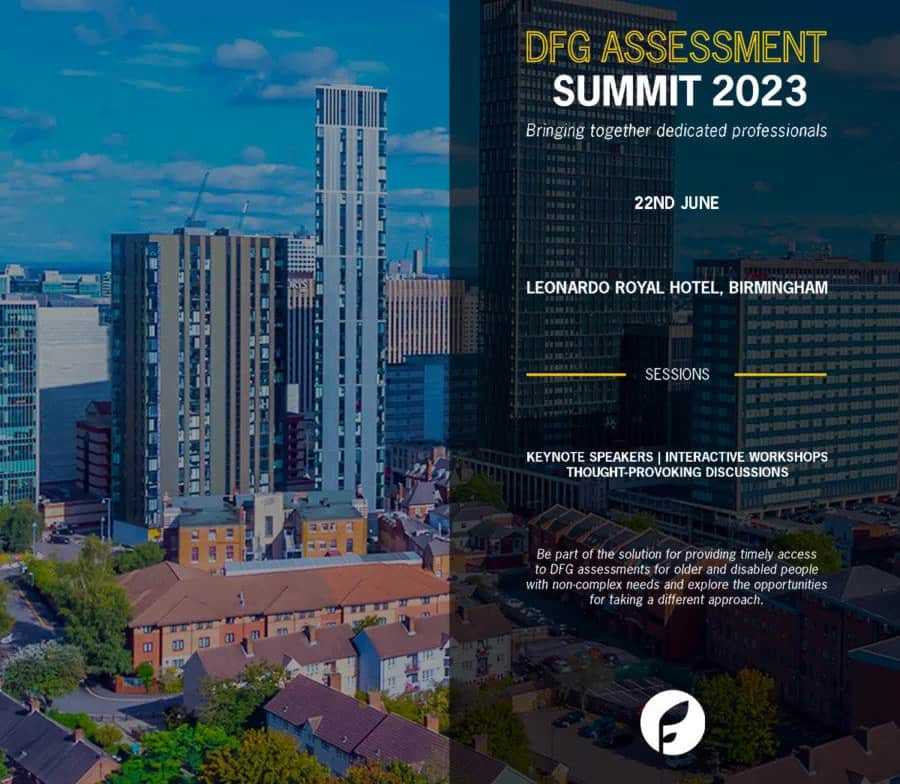Councils to explore a different approach to providing more timely access to DFGs at event

Foundations, the national body for home improvement agencies, is hosting a DFG Assessment Summit in June, which will give adaptations professionals the chance provide better pathways to Disabled Facilities Grant (DFG) funding.
DFG Assessment Summit 2023 takes place on 22 June 2023 from 9am-3.30pm at the Leonardo Royal Hotel in Birmingham. Interested attendees can register for a ticket here. Currently, early bird tickets are on sale for £45.
There is a strong relationship between the DFG and social care assessment because of the duty of housing to ‘consult’ with social care on the type of adaptations that are relevant to meet the needs of older and disabled people.
Since the publication of the Royal College of Occupational Therapists’ ‘Adaptations without delay’ paper in 2019, many local authorities have started to look at how to provide timely access to the assessments that ultimately lead to a DFG. However, there continues to be long waits for assessments in many local authorities, particularly for those older and disabled people whose situations are not considered complex or urgent.
These lengthy waiting lists for DFG assessments need tackling, if the adaptations sector is to achieve the UK Government’s goal around the DFG being a cornerstone for helping people to remain in their homes, as detailed in the 2021 ‘People at the Heart of Care: Adult Social Care Reform White Paper’.
In the context of these issues, DFG Assessment Summit 2023 will give practitioners, managers, and commissioners across housing, health, and social care the space to debate the current approach to supporting older and disabled people with non-complex needs access to the DFG.
By understanding the current barriers, delegates will explore the opportunities for taking a different approach that will provide more timely access to the DFG.
Using learnings from the event, Foundations will work with stakeholders to develop real-world solutions to the issues identified during the day.
By attending, professionals will learn, share, and understand the current barriers of providing timely access to an assessment for older and disabled people with non-complex needs.
Local authorities will also identify changes that could be implemented to improve access to assessment for older and disabled people with non-complex needs.
Councils will challenge their approach on the duty to consult on what adaptations are necessary for older and disabled people needing adaptations.
Attendants will also can get involved with workshops where they will be able to discuss and debate solutions to the real-world problems experienced by local authorities wanting to provide more timely access to adaptations for older and disabled people with non-complex needs access to the DFGs.
These workshops include:
- Self- and remote assessment: What are the barriers and opportunities for self- and remote assessment?
- Trusted assessor model: How can the trusted assessor models work effectively for the DFG process?
- Role of manufacturers and suppliers: What are the risks and benefits of involving manufacturers and suppliers in reducing assessment demand on social care?
- ‘Mop-up’ assessment services (waiting list management) and do they work: What are the strengths and weaknesses of this approach and how can it be made a sustainable approach to managing waitlist issues?
- Assessment of need vs Assessment for what is necessary and appropriate: Explore and unpick the legal status of different assessment pathways that might lead to a DFG, and are these causing unnecessary delays in accessing the DFG?
- Redefining ‘consultation’: What are the risks and opportunities for redefining consultation across housing and social care for older and disabled people with non-complex needs?
There will also be keynote speakers throughout the day that will discuss the need to change the current approach to DFG assessments.
Speakers include Rachel Russell, Senior Regional Advisor at Foundations; Anita Mottram, Principal Occupational Therapist at Kirklees Council; Lauren Walker, Professional Adviser at the Royal College of Occupational Therapists; Vikki McCall, Senior Lecturer in Social Policy (Housing) at the University of Stirling; and Vicky Gayle, Journalist at the Bureau of Investigative Journalism.
Some of the sessions throughout the day will cover the current evidence base, making the best use of resources, the impact of doing nothing, suppliers’ and manufacturers’ role in adaptations assessments, self and remote assessments, mop-up assessments services/models, redefining consultation, assessment of need vs assessment for design or legal status of assessments, and more.

